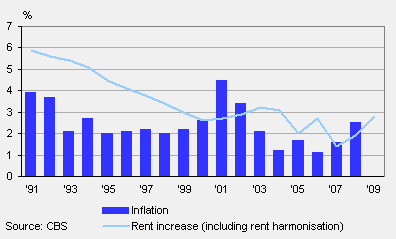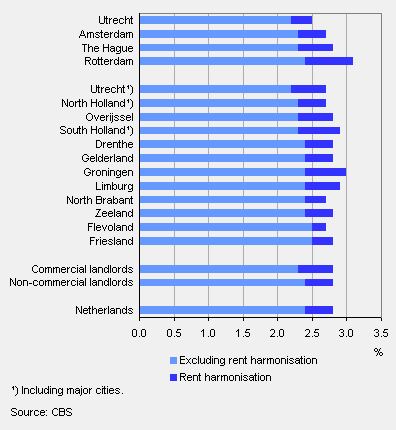Most substantial rent increase in half a decade

Rents of residential property were raised by 2.8 percent on 1 July 2009, the most substantial increase since July 2004. The harmonisation accounts for 0.4 percentage points of the rent increase. The rent increase corrected for new tenants of 2.4 percent is just below the maximum rent increase allowed for residential property (2.5 percent).
Residential rents and inflation

Highest rent increase recorded in Rotterdam
Out of the four major cities in the Netherlands, i.e. Amsterdam, Rotterdam, The Hague and Utrecht, rents increased most in Rotterdam for the second year running. The increase amounted to 3.1 percent and was partly caused by the rent harmonisation of 0.7 percentage points. With 2.5 percent, the lowest rent increase was recorded in Utrecht. The effect of the rent harmonisation on the annual rent increase was less prominent than in Utrecht.
Residential rents by province and in the four major Dutch cities

Sharpest increase in the province of Groningen
Residential rents were raised most (by 3 percent) in the province of Groningen predominantly as a result of rent harmonisation. The provinces of Flevoland, Utrecht, North Holland and North Brabant had the lowest rent increase (2.7 percent).
Rents non commercial landlords rise more rapidly
Corrected for new tenants, the average rent imposed by non commercial landlords was raised by 2.4 percent in 2009, as against 2.3 percent for commercial landlords.
Most residential rents (more than 92 percent) imposed by non commercial landlords were raised by 2 to 3 percent (excluding harmonisation). In the case of commercial landlords, 71 percent of rents were raised by 2 to 3 percent.
Residential property by rent increase (excluding rent harmonisation)

Service costs rise more rapidly than rents
The increase in service costs is 3.9 percent. This is predominantly caused by an increase in energy costs in communal areas (e.g. costs of lighting).
Bert van Zanten